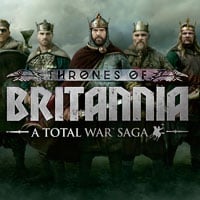Total War Saga Thrones of Britannia: How to develop your province in the right way in Total War Thrones of Britannia?
Last update:
Developing your province in the right way is very important, especially when you can't expand your territory and you have to rely on a smaller number of provinces. Planning your development and building structures in the right provinces should give you more profits from taxes and it will result in a better production of various resources.
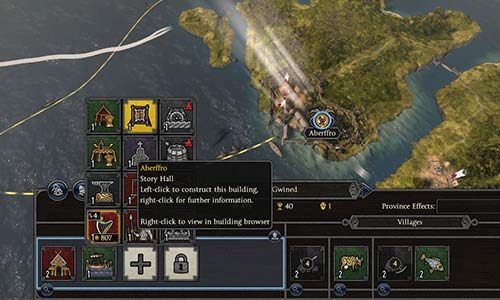
Instead of a special building, it is better to construct a Blacksmith - it will harmonize with the rest of the mines in the area and provide higher income.
Most of the times the choice is simple: in a town, you should build structures from the same economy branch as in other settlements. If you have Farms and Orchards in your 3 regions then you should also build a structure in a town that would give you a bonus to profits from agriculture. However, sometimes, it is better to focus on keeping public order on a high level before you move to maximize the profit. This means that it is better to build structures from Community or Trade civic trees and then build a Water wheel or Granary to keep increasing your profits.
Note! The only way to increase space in a capital is to upgrade the main building. Each level gives you one extra slot, a few bonuses and an increase in maintenance costs.
After building the structures you should focus on upgrading the buildings. Start with production buildings in settlements. Unlike the buildings in towns that usually increase a profit's percentage and, sometimes, they need gold to be functioning, structures in settlements give you "pure" profit. The majority of that profit is achieved by your settlements. This means that it is better to upgrade Mines before you build/upgrade a Forge.
If you do the opposite (upgrade buildings in towns first instead of those in settlements) then your bonuses will be smaller than those received from structures in settlements. Certain buildings in towns need gold from your treasury to stay active. Don't build structures in a capital when you have a small number of villages with buildings from the same economy field or when your profits aren't high enough (this will only slow down your development).
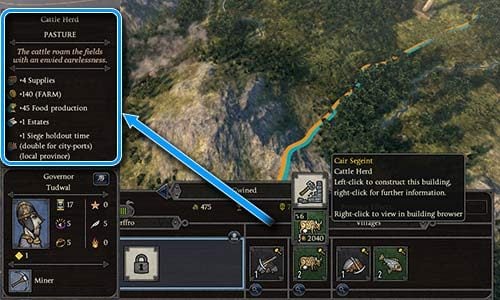
Also, the majority of the settlements can give you additional bonuses, e.g. Farms, besides agriculture profits, provide you with food, while Community buildings (purple) give public order bonus. Try to upgrade those settlements that can quickly work together with other settlements (e.g. bonuses to a certain economy field) or can work with available buildings in towns. Focus on these settlements first or think about conquering the right region or a province in your neighborhood.
To get maximum profits, you will have to develop provinces and regions. Start with the following economy fields:
- Industry. Offers the biggest gold profit but at a cost of public order. Higher levels cause a great decrease in public order - think about bringing the right governor or invest in buildings that improve public order. Certain urban buildings offer military bonuses. A Blacksmith gives you option to upgrade armors and weapons of all units in a given province.
- Trade. Another good source of gold, especially some of the building upgrades. They often offer bonuses to other economy branches or to trade itself. Certain buildings have an impact on public order - negative or positive. Develop this province once your food production is upgraded and you don't have problems with keeping peace in your kingdom.
- Agriculture. This economy branch doesn't offer much profits although this can change over time. It can start giving you rather good profits but this requires you to upgrade production buildings and to place 1-3 buildings in a town. This branch's most important role is to produce food. You will often find yourself upgrading this economy branch, despite its smaller profits.
- Community. The main goal of these buildings is to increase public order. People in these provinces are usually very happy. Some of the structures in this branch speed up scientific researches. The only buildings from this branch that can give you a little bit of profit are, e.g. Monasteries that can be raised in settlements. Buildings in towns usually need gold to remain functioning. Combine this branch with Industry buildings. Industry buildings give you profit while Community balances anxiety created by them.
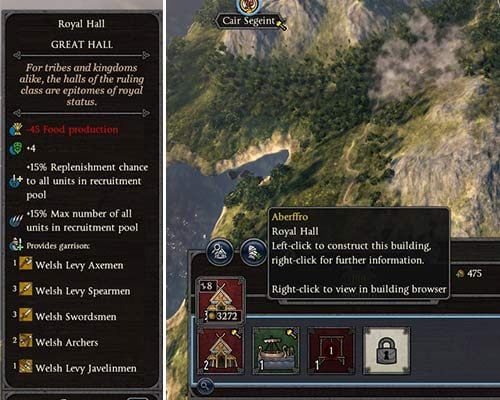
You don't have to worry about military structures (marked in red) that allow you to recruit specific units (like in the previous games in Total War series). Thanks to that you don't need provinces that specialize in the military (their goal is to recruit large and modern armies). Although some of the structures are still useful, e.g. those that can replenish your units faster, increase your garrisons' size or grant extra XP to units inside of a town, the choice of which military building you want to place isn't that important. Buildings that boost public order and remove corruption are worth mentioning here. Neighbor provinces will also use this bonus. This means that placing this type of structures is very important.
Another thing you don't need to remember is to upgrade walls or to develop castles. Only capitals have walls - they don't undergo any changes through the entire campaign (although sieges, will undergo changes thanks to technology development). Develop new technologies to get access to better units. After that they will become available in every camp or settlement.
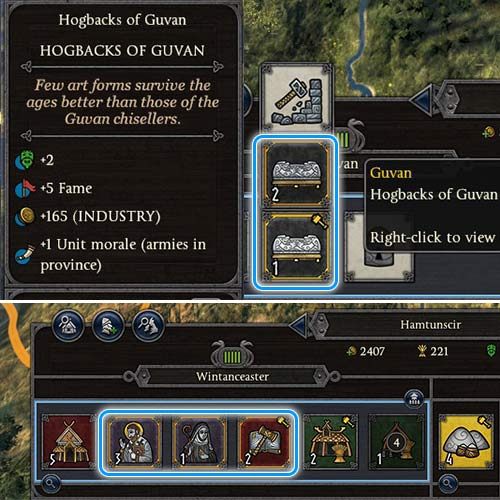
Certain nations or provinces have special and unique buildings or structures that are based on a particular culture. Replace your standard buildings with these unique ones when your food, gold and public order are all at a high level. Thanks to that you will receive unique bonuses for that particular province or to your entire nation. Culture buildings are simply variations of an existing structure, e.g. a Church. After capturing a province, you will have to reconstruct a building to your counterpart. If you won't do that, the majority of bonuses won't work on a region, province or even the entire kingdom.
You are not permitted to copy any image, text or info from this page. This site is not associated with and/or endorsed by the developers and the publishers. All logos and images are copyrighted by their respective owners.
Copyright © 2000 - 2026 Webedia Polska SA for gamepressure.com, unofficial game guides, walkthroughs, secrets, game tips, maps & strategies for top games.
